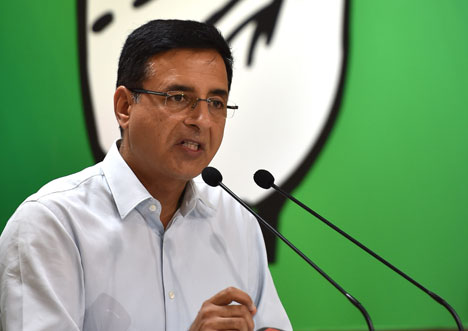The Congress has sought immediate convening of Parliament, expressing concern that the Narendra Modi government was unilaterally taking key decisions that could have far-reaching implications for national security.
Congress spokesperson and former Union minister Anand Sharma cited the decisions to open up “sensitive sectors” and said that parliamentary oversight was continuing through videoconferencing in all major countries.
“Has corona empowered the government to embark on a grand sale of national assets? The nation assiduously built its public-sector units over decades. They are (apparently) now the personal property of this government,” he said.
“They are opening up sensitive sectors – nuclear, space. Our nuclear and Isro (Indian Space Research Organisation) data contain highly classified information. Coal mines are national assets.
“The states have a right to the national resources. How can you take decisions (on these) without discussion, without parliamentary approval? Corona doesn’t mean we are no more a parliamentary democracy. In all major countries, parliamentary committees are working. We can’t run the country by ordinance.”
On Saturday, the government had announced decisions to open up the coalmining, space travel and nuclear sectors to private parties, in addition to allowing 74 per cent FDI in defence manufacturing.
The Congress has alleged that instead of managing the pandemic, supporting the struggling poor and rebooting the economy, the government is fooling people and pushing a sinister political agenda.
“Many of the announcements made by the finance minister in the last five days require parliamentary approval and scrutiny,” another former Union minister, Jairam Ramesh, said. “It’s imperative that Parliament is convened at the earliest.”
Ramesh tweeted: “The public sector built India. It made India strong and self-reliant. Now in the name of ‘Atmanirbhar Bharat’, Modi-style, the public sector is being taken to the shamshaan ghat (cremation ground).”
On the fifth tranche of the relief package, announced by finance minister Nirmala Sitharaman on Sunday morning, Ramesh said: “Bogus claims by the Prime Minister exposed. So far: Loan+Liquidity = Rs 16.6 lakh crore. Subsidy+Cash = Rs 3.2 lakh crore. This amount includes old announcements & programmes. If ever there was a fraudulent package, this is one.”
Party communications chief Randeep Surjewala described Sunday’s package as “trickery, fakery and quackery”.
Sharma echoed the sentiment, saying: “It is clear the government has no strategy, no plan, no understanding of the nature of the crisis. They don’t know how to restart the economy. Loan and credit guarantees aren’t called financial assistance. No economist will endorse the government’s approach. They failed to transfer money to the distressed people and small businesses.
“The Prime Minister dramatically announced a stimulus package of Rs 20 lakh crore, which is 10 per cent of the GDP. The package is barely 1.6 per cent, totalling Rs 3.22 lakh crore.”
Sharma attacked the government’s move to facilitate loans for the poor instead of providing immediate relief, and dared Sitharaman to a public debate on the package.
“If you don’t support the MSMEs in bearing the salary burden, they can’t survive. Passing orders not to cut salaries means nothing,” he said. “If you tell a farmer whose entire produce of vegetable was destroyed during the lockdown to take a loan, you are trying to drag him into a debt trap. If you tell the street vendor who hasn’t earned a single paisa for two months to take credit, it is a cruel joke.”
Sharma argued that the government had done nothing for the poorest for 50 days.
“Under the National Food Security Act, it is the right of the poor to get food. But the government took 50 days to announce that those who do not have ration cards will also be given food grains,” he said.
“The finance minister claimed three meals were being given to the migrant labourers. This shows how disconnected they are from reality.
“They gave Rs 500 to women holding Jan Dhan accounts. Only 21 per cent women have accounts. And what can you do with Rs 500? Our suggestion for Rs 7,500… would have given confidence to the poor.”











